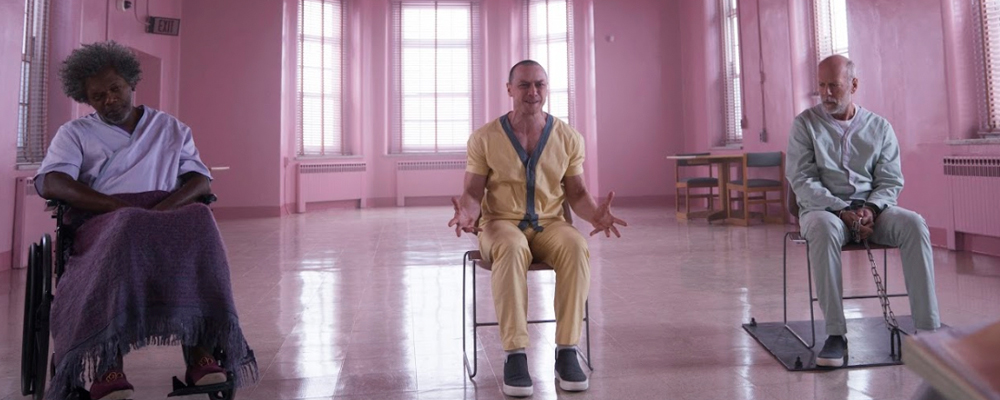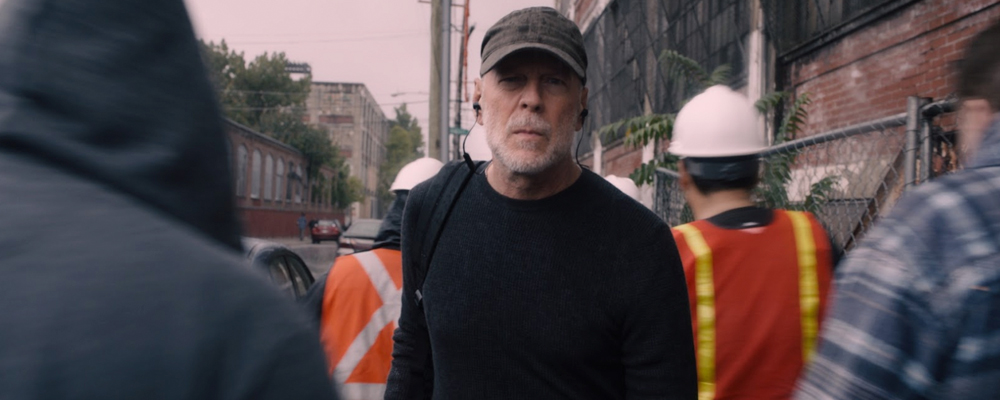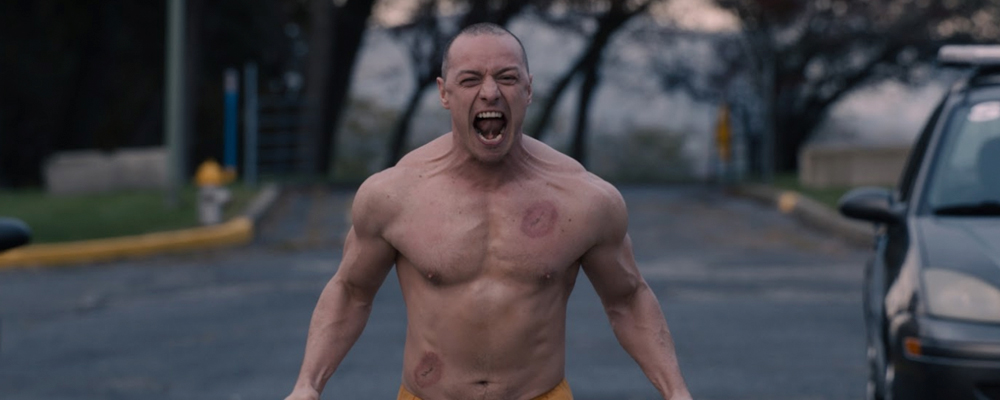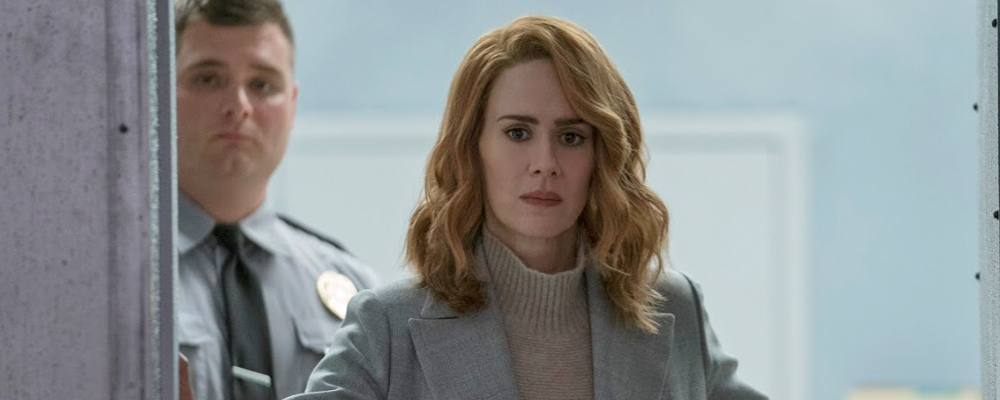M. Night Shyamalan’s ‘Glass’ Dabbles in Superhero Mayhem
Alci Rengifo
“Glass” plays like a sequel attached to a prequel with a messy superhero romp thrown in at the end. 19 years ago director M. Night Shyamalan made “Unbreakable,” a unique take on the very idea of comic book personas. It was an elegant, wonderfully strange film full of atmosphere, grounded in the kind of realism that later filmmakers like Christopher Nolan would utilize so well in his Batman movies. Bruce Willis starred as a security guard named David Dunn, who survives a massive train wreck without a scratch. This convinces a comic book curator named Elijah (Samuel L. Jackson) that Dunn could be the actual embodiment of a superhero. Of course he is, and Elijah is therefore the super villain. Shyamalan returned to the world of this story with 2017’s “Split,” which introduced a new villain into the mix, a multi-personality lunatic played by James McAvoy. “Glass” continues the saga, but proceeds to turn it into just another action flick where big men slam each other around against concrete. It begins with the tone of the original then turns itself precisely into the kind of movie it was trying not to be.
19 years after the events of “Unbreakable” and apparently David Dunn (Willis) still prowls the streets at night in his raincoat, fighting crime as a shadowy figure called “The Overseer” on social media. By day he runs a security company with his son Joseph (Spencer Treat Clark reprising his role). When the multi-entities who claim allegiance to The Beast (McAvoy) kidnap a group of cheerleaders, David tracks down his lair and frees the captives. But before he or The Beast can escape they are captured by a team led by a psychologist, Dr. Ellie Staple (Sarah Paulson). Staple takes the pair to a psychiatric facility where Elijah (Jackson), who goes by Mr. Glass due to his rare medical condition which makes his bones extremely frail, is also being kept. Staple’s interest is in individuals who are convinced they are beyond human and have special abilities, or powers. She wants to find a way to convince these three that they are living nothing more than a delusion. Per her theory, David has convinced himself he has super strength, Glass that he is an arch-villain mastermind, The Beast that he’s some kind of otherworldly force. As she interviews and tries to dig into their psyches, Staple doesn’t understand that she is merely provoking these unique individuals into finding a way to break out and demonstrate who they are.
“Glass” suffers from the kind of wrap up syndrome that affects most trilogies. It wants to find enough space to cram in everything fans can recognize from the last two movies while attempting to mold some kind of dramatically fulfilling, coherent story. Shyamalan starts it off well, bringing us back into the shadowy, rain-drenched ambiance of “Unbreakable” and “Split.” In an early scene Bruce Willis does a variation on the classic Batman appearance, popping up in the house of two punks who like to film themselves assaulting random pedestrians. Joseph is now his equivalent of an Alfred, monitoring computer screens for activity in the city, keeping track of police scanners. We learn that David’s wife Audrey died a few years ago (which could mean Robin Wright didn’t feel like making an appearance). For longtime fans of “Unbreakable” these moments are full of wonderful nostalgia, especially when we see David emerge from the shadows in his trademark raincoat. When he first confronts McAvoy’s crazed villain we recognize the measured visual style of early Shyamalan movies, where suspense is based more on tension than just violence. However the passage of nearly 20 years does leave us with some interesting questions. Is The Beast really the only super villain David has ever had to fight? Why has it taken so long for Staple’s organization to track him down? He seems to operate in the same city, with the same wardrobe all the time. Narrative consistency is always one of the big risks in this era when sequels constantly pick up decades-old plots.
When the story moves into the psychiatric ward it offers some brief, interesting ideas. At first Shyamalan seems to be playing around with the very notion of the superhero genre, nearly satirizing it as Staple confronts her three patients and their perceptions of themselves. There’s not much from Mr. Glass at first, he simply sits there, comatose in a wheelchair. But once he does speak and all hell breaks loose, the whole film just spirals into narrative mayhem. The script becomes a sloppy action flick to put it simply. Glass becomes convinced he, David and Beast are in a particular sort of comic book plot, so he schemes to unleash The Beast and guide him towards a shiny new high rise where he can have a final, epic battle with David. For good measure Shyamalan brings back Glass’s mom (Charlayne Woodard), who has no real purpose other than to just stand around while everyone fights. At times she offers one or two emotive lines about how Glass was never a mistake. Casey Cooke (Anya Taylor-Joy), McAvoy’s kidnap victim from “Split,” also returns to try and reach out to him, but she is also reduced to being a sideline character, standing next to Joseph as The Beast and David duke it out in the facility parking lot, smashing cars, punching and doing bear hugs. Shyamalan seems rushed to close it all up to the point where he overdoes it with his own cameo, a very corny attempt at winking at the first movie.
“Unbreakable” pre-dated the ongoing wave of superhero movies overflowing the market, and was impressive in how absorbing it could be with simple drama, little action and evocative music. David and Elijah were fascinating as characters, here they seem to be trying to copy Marvel except the budget isn’t there. “Glass” becomes the very kind of movie “Unbreakable” moved away from. The last half hour is a rambling action sequence where Shyamalan caps it all off with his trademark habit of throwing in a twist. But the surprise is a half-formed idea, so unconvincing it’s almost a parody. Without spoiling, the twist immediately begs the question, “so why do they have to meet in a fancy restaurant?”
The best performance is by McAvoy, who as in “Split” again impresses with his virtuoso capacity to switch between personalities, tones and voices. Willis is as silent as a brick while Samuel L. Jackson’s haunted Glass becomes the SNL version of Magneto by the end. It’s a shame. For Shyamalan “Split,” as well as “The Visit” before that, had marked a return to form after a few subpar deliveries over the last decade. But with “Glass” this filmmaker of such style, who with a movie like “The Sixth Sense” could grip an audience through sheer mood, becomes woefully equal to the movies he once shamed. “Glass” breaks under the weight of too many superpowers and not enough power in the story.
“Glass” premieres Jan. 18 in theaters nationwide.





